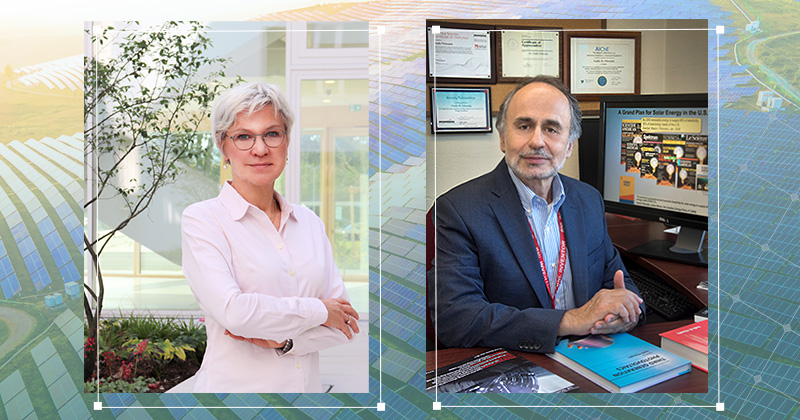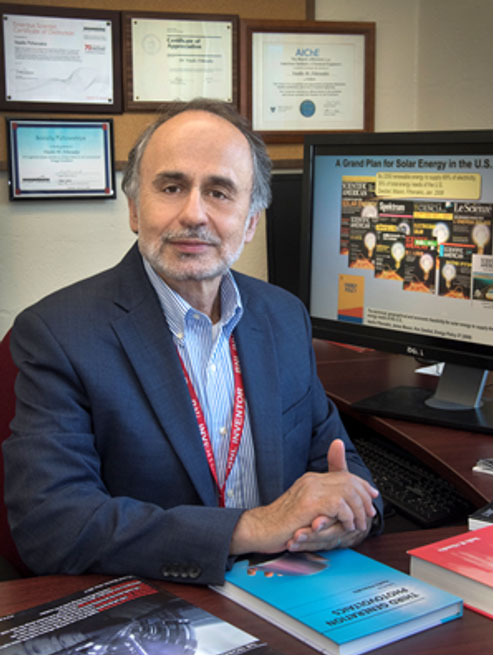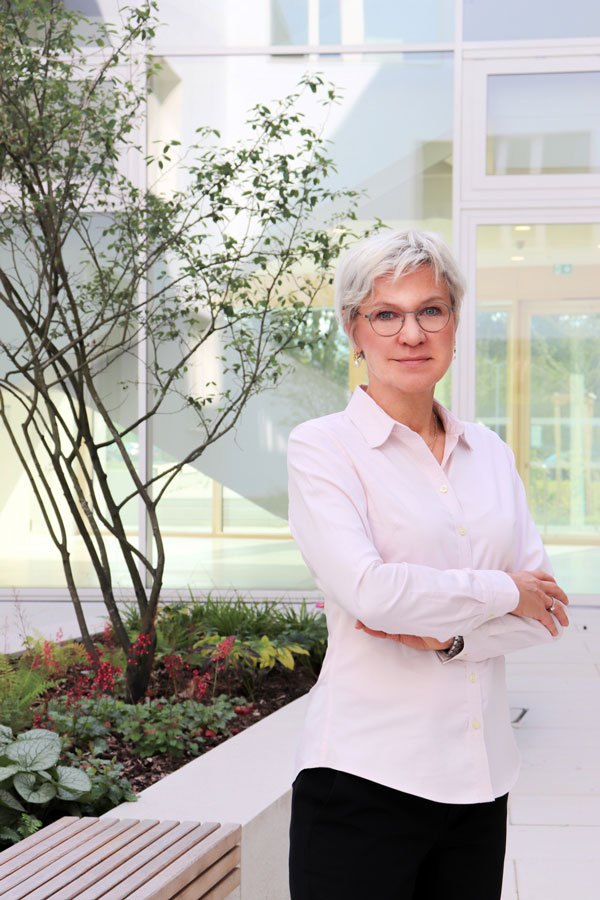


Winners of 2022 Böer awards announced
Photos courtsey of Vasilis Fthenakis and Anke Weidenkaff April 06, 2022
Fthenakis, Weidenkaff recognized for distinguished contributions to quest for sustainable energy
Two prominent researchers — one a pioneer of solar energy research, the other a mid-career champion of renewable energy and sustainable technology — have been selected for 2022 Karl Böer awards, endowed by the late solar pioneer Karl Böer at the University of Delaware.
Vasilis Fthenakis, a pioneer in studies of large-scale deployment of solar power and the founding director of the Center for Life Cycle Analysis at Columbia University, was selected for the 15th Karl Böer Solar Energy Medal of Merit. The medal comes with a $100,000 prize.
Anke Weidenkaff, executive director of the Fraunhofer Institute for Materials Recycling and Resource Strategies (IWKS) in Germany and a professor at the Technical University of Darmstadt, Germany, was selected for the first Karl Böer Renewable Energy Mid-Career Award. The award comes with a $25,000 prize.
The awards will be presented May 3 at the University of Delaware.
“These two distinguished scientists demonstrate the wide range of scientific contributions needed to advance our transition toward carbon-free energy,” said William Shafarman, director of the Institute of Energy Conversion, founded by Dr. Böer in 1972, and professor of materials science and engineering at the University of Delaware. “The visionary work by Professor Fthenakis at the interface between energy and the environment has been critical to overcoming barriers and perceptions needed to advance large-scale deployment of solar energy systems. Professor Weidenkaff’s contributions in materials for a range of sustainability applications set an incredibly high bar for excellence as the inaugural winner of the Renewable Energy Mid-Career Award.
“Together, these awardees personify the intent of the Böer Medals to celebrate extraordinary and enduring contributions to a more sustainable future for our planet.”
It is the first time since the founding of the Böer Solar Energy Medal of Merit in 1993 that two different Böer awards have been presented.
The Award Committee is composed of the presidents of the International Solar Energy Society, the American Solar Energy Society, the American Institute of Chemical Engineers, the American Physical Society, the Institute of Electrical and Electronic Engineers, the director of the National Renewable Energy Laboratory, the U.S. Secretary of Energy, or their designated representatives, a representative of the Böer family and the executive director of the Karl W. Böer Solar Energy Medal of Merit Award Trust.
The Böer Solar Energy Medal of Merit

The Solar Energy Medal of Merit is awarded to a world-renowned individual who has made significant, pioneering contributions in solar energy, wind energy, or other forms of renewable energy as an alternate source of energy through research, development, or economic enterprise, or to an individual who has made extraordinary, enduring contributions to the fields of solar energy, wind energy, or other forms of renewable energy in other ways.
Fthenakis was nominated by Arnulf Jäger-Waldau of the European Commission’s Joint Research Centre in Varese, Italy, for “pioneering research at the interface of energy and environment that provided the underpinning of energy lifecycle impacts and catalyzed photovoltaic technology advancement and deployment worldwide.”
With a background in chemistry and chemical engineering, Fthenakis earned his doctorate in fluid dynamics and atmospheric science at New York University.
He is a distinguished scientist emeritus at Brookhaven National Laboratory, where he did research for 36 years, and continues his 27-year affiliation with Columbia University, where he is a senior research scientist, adjunct professor and founding director of the Center for Life Cycle Analysis. He is a Fellow of the American Institute of Chemical Engineers, the Institute of Electrical and Electronics Engineers and of the International Energy Foundation.
The Böer Renewable Energy Mid-Career Award

The Mid-Career Award is presented to an active researcher, within 20 years of earning their highest degree, who is making significant contributions with promise for enduring impact in solar energy, wind energy, or other forms of renewable energy through research, development, or economic enterprise, or to an individual making extraordinary valuable and enduring contributions to the fields of solar energy, wind energy, or other forms of renewable energy in other ways.
Weidenkaff was nominated by David Cahen, professor emeritus at the Weizmann Institute of Science in Rehovot, Israel, for “visionary leadership and pathbreaking in renewable energy and sustainability technologies with seminal contributions to materials for solar fuels, thermoelectric converters, catalysts, and self-regenerative functionalities.”
In his letter of nomination, Cahen said Weidenkaff is “one of the best and most interdisciplinary solid-state materials scientists working on renewable energy technologies, whose research reflects not only excellence and ingenuity but also impact on society.”
With a background in pharmacy and chemistry, she earned her doctorate in solid state chemistry at ETH Zürich. Before joining the faculty of the Technical University of Darmstadt, she was a professor at the University of Stuttgart, the University of Bern and the University of Augsburg.
About Karl Böer
Karl Wolfgang Böer was a trailblazing scientist in the field of renewable energy and founder of UD’s Institute of Energy Conversion (IEC), which marks its 50th anniversary this year. The IEC, the oldest solar cell institution in the world, has been a leader in photovoltaic research and is a U.S. Department of Energy-designated University Center of Excellence for Photovoltaic Research and Education.
Dr. Böer’s work led to significant progress in the field of renewable energy. He died on April 18, 2018, but the medals he endowed through the Karl W. Böer Solar Energy Medal of Merit Award Trust, established at the University of Delaware in 1991, continue to honor leadership in all forms of renewable energy. The first Böer Medal was awarded in 1993 to former President Jimmy Carter.
Böer Solar Energy Medal of Merit winners
1993: President Jimmy Carter, for spurring development and focusing world attention on the relatively unknown technology for safe and environmentally sound energy production from the sun.
1995: David E. Carlson, for the discovery and commercial development of thin film amorphous silicon cells for converting sunlight to electrical energy.
1997: Adolf Goetzberger, for his leadership in the international solar energy community, his research accomplishments and for founding the eminent Fraunhofer Institute for Solar Energy Systems.
1999: Stanford R. Ovshinsky, for pioneering the science of amorphous semiconductors resulting in the development of low-cost, thin-film silicon solar cells.
2001: Allen M. Barnett, for his pioneering high-performance, thin-crystalline silicon solar cells and outstanding continuing service to the solar electric power community.
2003: Martin A. Green, for his innovative research efforts in the development of high-performance crystalline silicon solar cell technology.
2005: Yoshihiro Hamakawa, for his significant pioneering contributions to the development of high-efficiency, thin-film solar cells and the advancement of solar photovoltaic science and technology as a clean energy source.
2007: Lawrence Kazmerski, for his leadership in the field of solar electricity from its infancy.
2009: Hermann Scheer, for his long-lasting and worldwide commitment to the dissemination of solar energy.
2011: Richard M. Swanson, for his innovation in the field of photovoltaics and for his tenure as president of SunPower Corp.
2013: Zhores I. Alferov and Viacheslav M. Andreev, for their contributions to the investigation and development of semiconductor device technology and physics, which have led to greater performance and efficiency of solar cells and arrays.
2015: Antonio Luque, for inventing the intermediate brand solar cell, which raises the efficiency limit from 41 percent to 63 percent.
2016: D. Yogi Goswami, for his work to improve efficiency in the storage of solar energy and his quest to use solar energy as a catalyst to address environmental problems.
2018: Alex Zunger, for new theories to improve the performance of solar devices and unconventional approaches to finding new materials to power solar technology.
2020: No award
2022: Vasilis Fthenakis, for pioneering research at the interface of energy and environment that provided the underpinning of energy lifecycle impacts and catalyzed photovoltaic technology advancement and deployment worldwide.
Böer Renewable Energy Mid-Career Award
2022: Anke Weidenkaff, for visionary leadership in renewable energy and sustainability technologies, with seminal contributions to materials for solar fuels, thermoelectric converters, catalysts and self-regenerative functionalities.
Contact Us
Have a UDaily story idea?
Contact us at ocm@udel.edu
Members of the press
Contact us at mediarelations@udel.edu or visit the Media Relations website

